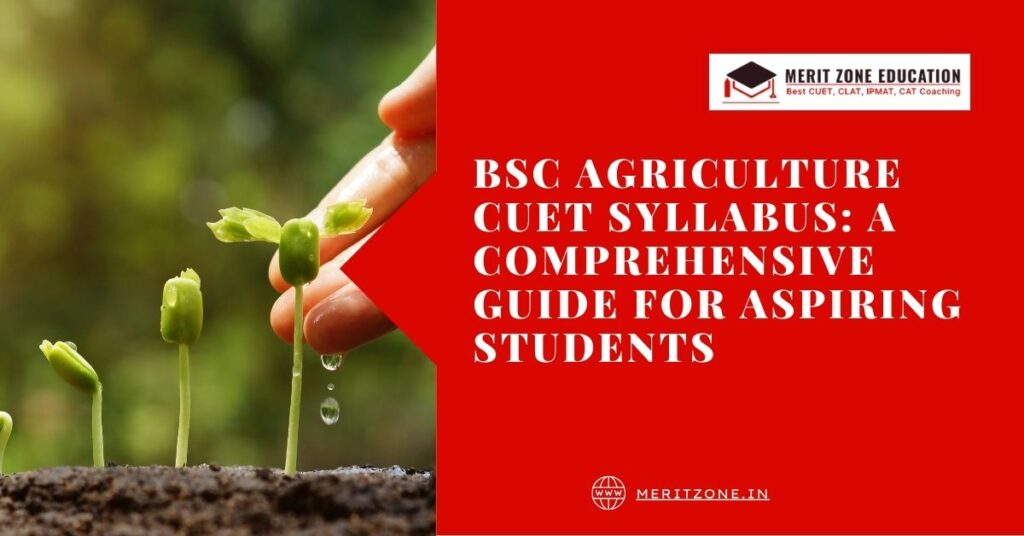Unlock your future in agriculture with our comprehensive guide to the CUET syllabus—your roadmap to success in 2025! Whether you’re preparing to join a prestigious university or simply exploring academic options, understanding the CUET (Common University Entrance Test) syllabus is essential for BSc Agriculture aspirants. This guide will provide you with an in-depth breakdown of the exam structure, subject weightage, and tips to prepare effectively—setting you up for academic triumph.
What is CUET?
The Common University Entrance Test (CUET), conducted by the National Testing Agency (NTA), is a national-level exam designed to streamline university admissions for students across India. For aspiring BSc Agriculture students, CUET opens doors to prestigious institutions while evaluating essential skills and knowledge in domain-specific subjects related to agriculture.
Exam Format
The CUET (Common University Entrance Test) is a Computer-Based Test (CBT) designed to assess the skills and knowledge of students aspiring to enter various undergraduate programs. The exam is divided into multiple sections, covering language proficiency, domain-specific subjects, and a general test. For students aspiring to pursue a BSc in Agriculture, the CUET plays a crucial role in testing your competence in subjects that form the foundation of agricultural studies, ensuring you are well-prepared for the challenges ahead.
Here’s an expanded overview of the sections applicable to BSc Agriculture aspirants:
- Section IA & IB: Language Proficiency
This section evaluates your command of English or your chosen regional language. Proficiency in language is essential for academic success, as it underpins your ability to understand study materials, write academic reports, and communicate effectively.
This part of the test assesses your reading comprehension, grammar, vocabulary, and verbal ability. It is advisable to focus on improving your reading speed and understanding of complex texts to excel in this section.
- Section II: Domain-Specific Subjects
As a BSc Agriculture aspirant, this is one of the most critical sections. You will need to demonstrate your understanding of key subjects like Biology, Chemistry, Physics, and Mathematics, depending on the eligibility criteria of your chosen university.
These subjects are the building blocks of agricultural studies, covering topics like plant biology, soil science, environmental chemistry, and mathematical techniques essential for agricultural research. Focus on strengthening your knowledge in these areas, and don’t overlook the importance of practical applications and problem-solving skills.
- Section III: General Test
This section tests your logical reasoning, quantitative aptitude, and awareness of current affairs. Logical reasoning evaluates your ability to analyze and solve problems, while the quantitative aptitude portion measures your mathematical skills in areas such as arithmetic, algebra, and data interpretation.
Additionally, staying updated with current affairs, particularly in areas related to agriculture, environment, and technology, will give you an edge in this section. This part of the test also helps assess your general awareness, critical thinking skills, and ability to approach real-world problems.
Understanding the CUET format is essential to crafting an effective preparation strategy. By identifying the sections that carry significant weightage and aligning your study plan accordingly, you can maximize your performance.
Prioritize consistent practice through mock tests and question banks to familiarize yourself with the test format and manage your time effectively. With the right preparation, you can ensure that you not only succeed in the CUET but also lay a strong foundation for your journey in agricultural studies. Good luck!
Detailed Syllabus Breakdown
To ace the CUET for BSc Agriculture, it’s vital to familiarise yourself with the syllabus. Below is a detailed breakdown of all the major sections relevant to this course.
1. Language Sections (Section IA & IB)
Command over language is crucial for effective communication and academic success. This section tests your skills in reading comprehension, grammar, and vocabulary.
Key Topics to Cover
- Reading Comprehension: Identifying main ideas, inferences, and tone in passages.
- Grammar: Sentence correction, tenses, and prepositions.
- Vocabulary: Antonyms, synonyms, and idiomatic phrases.
2. Domain-Specific Subjects (Section II)
This is the most critical section for BSc Agriculture aspirants as it directly tests your knowledge of agricultural science and related disciplines.
Core Subjects and Topics
a) Biology
- Plant biology and classification.
- Genetics and evolution.
- Ecology and environmental biology.
b) Chemistry
- Basics of organic chemistry (structure and reactions).
- Biochemistry focusing on plant growth and fertilizers.
- Agricultural applications of chemical compounds.
c) Mathematics
- Basic calculations in quantitative techniques.
- Statistics and data interpretation for agricultural studies.
3. General Test (Section III)
This section evaluates your logical reasoning, quantitative aptitude, and understanding of current affairs—crucial for staying updated in a dynamic field like agriculture.
Key Topics to Cover
- Logical Reasoning: Patterns, analogies, and syllogisms.
- Quantitative Aptitude: Percentages, profit-loss, and averages.
- Current Affairs: Issues related to agriculture, food security, and government schemes for farmers.
Chapter-Wise Weightage Analysis
To achieve top scores, it’s essential to focus on the chapters that carry higher weightage. Here’s a breakdown for prioritization:
1. Language Sections Weightage
- Reading comprehension usually accounts for 40-50% of the marks in the language section.
- Grammar and vocabulary contribute 50-60%, so brush up on your fundamentals.
2. Domain-Specific Subjects Weightage
a) Biology
- Genetics and molecular biology often hold 30% weightage.
- Ecology and plant biology cover around 50% cumulatively.
b) Chemistry
- Organic chemistry concepts make up 45%, while biochemistry accounts for 35%.
c) Mathematics
- Data interpretation and statistics hold 50% weightage.
3. General Test Weightage
Logical reasoning dominates this section with approximately 40% weightage. Quantitative aptitude and current affairs account for the remaining marks almost evenly.
Knowing these key areas ensures efficient preparation by focusing on topics with the highest scoring potential.
Strategies for Effective Preparation
1. Prioritizing High-Weightage Topics
Focus on high-weightage chapters first. Allocate more time to topics like genetics in Biology and data interpretation in Mathematics, as they frequently appear in exams.
2. Creating a Study Plan Around the Syllabus
Your study plan should balance all three sections. Dedicate specific hours daily for language, domain-specific subjects, and the general test. For instance:
- Morning sessions for solving Biology and Chemistry problems.
- Afternoons for logical reasoning practice.
- Evenings for vocabulary-building exercises.
Common Mistakes to Avoid
Preparation for CUET can be overwhelming, but avoiding these common pitfalls will improve your chances of scoring well:
- Ignoring Low-Weightage Sections: While focus is critical, ignoring small-weightage topics like basic grammar could cost valuable marks.
- Overemphasis on Favorites: Spending excessive time on familiar topics at the expense of others may backfire. Diversify your efforts.
- Neglecting Mock Tests: Real-time practice using mock exams enhances speed and efficiency, which are crucial for the CUET.
FAQs About BSc Agriculture CUET Syllabus
1. How do I interpret the syllabus pattern?
The syllabus is divided into three sections—Language, Domain-specific Subjects, and General Test. Focus on the topics mentioned under these areas for your preparation.
2. How should I balance my study time across sections?
Allocate time based on weightage and your strengths. Spend more time strengthening weaker sections without neglecting your strong areas.
3. What resources should I use for preparation?
Refer to NCERT books for basics and combine those with advanced guides for agriculture. Attempt mock tests regularly to track progress.
Start Preparing for Success
Cracking the CUET is your stepping stone to a rewarding career in agriculture. A thorough understanding of the BSc Agriculture CUET syllabus sets you apart and ensures confidence on exam day. Begin your preparation early, focus strategically, and make the most of the resources at hand.
For additional guidance, Merit Zone’s expert team is here to help you thrive. Join personalized coaching sessions where preparation meets clarity and efficiency. It’s your chance to unlock success—don’t wait another moment!
Conclusion
Preparing for the BSc Agriculture CUET is a journey that requires dedication, focus, and a strategic approach. By allocating your study time based on the weightage and your strengths, you can ensure a balanced preparation. Make use of reliable resources like NCERT books for the basics and advanced guides for agriculture-specific topics. Don’t forget to regularly attempt mock tests to track your progress and identify areas that need improvement. Remember, starting early and staying consistent is key to success. With thorough preparation and the guidance of Merit Zone’s expert team, you can approach the exam day with confidence and unlock your potential. So, don’t wait any longer – start your preparation today and embark on a rewarding career in agriculture.


